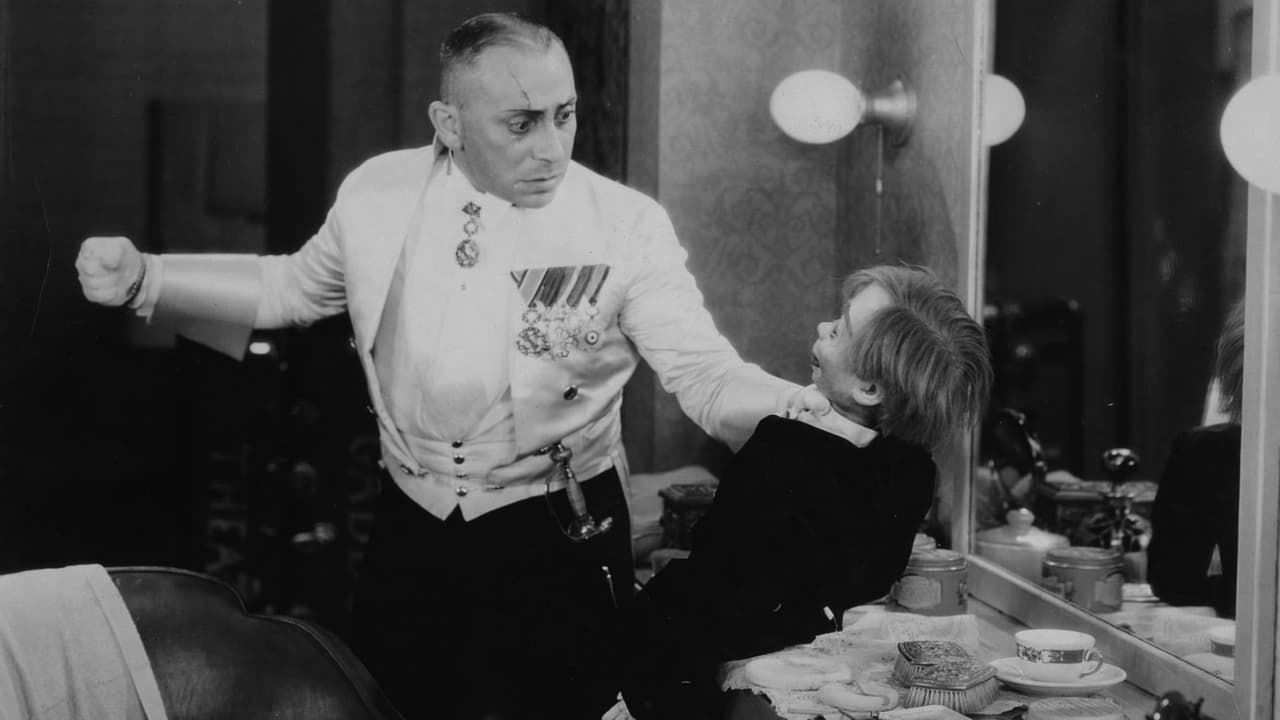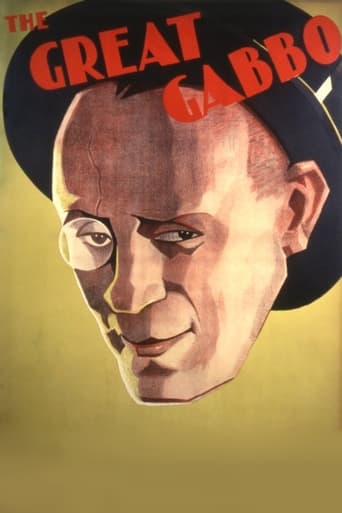

Good story, Not enough for a whole film
... View MoreIt was OK. I don't see why everyone loves it so much. It wasn't very smart or deep or well-directed.
... View MoreThe tone of this movie is interesting -- the stakes are both dramatic and high, but it's balanced with a lot of fun, tongue and cheek dialogue.
... View MoreI think this is a new genre that they're all sort of working their way through it and haven't got all the kinks worked out yet but it's a genre that works for me.
... View MoreThis is a strange little number because it's a pretty dark subject matter, which at times is pretty chilling to watch, but then they throw in lots of songs. I'm not too sure what the Directors were going for when they filmed this. I say this because it's evident, at times, that quite a few scenes were added later... and I cannot figure out why.I really like the idea of the mad ventriloquist. In this stories concept, he is in love with his assistant, Mary (Compson), though finds it hard to fully converse with her. As The Great Gabbo (Erich von Stroheim), as he sees himself, he's nasty, offensive, and disagreeable. However, when he speaks through the dummy he can be loving and charming. It's this fissure that eventually leads to his mental breakdown.I know that the musical moments are there because it's set in the vaudeville and theatre life, though for most of the time these feel more like padding - filling out time. I think this could be remade and be an actually powerful movie. Reduce the musical side and expand on the breakdown. There are times in this movie where chills ran down my spine. The part where Mary walks out on The Great Gabbo and the Dummy calls her softly back, to be reprimanded by Gabbo is both heartbreaking and creepy as hell.The film, in general, is entertaining, though I have to say I found the number of musical intermissions too much. These are also 1920's musicals so are not so relevant today. Also, the dancing isn't up to par with bigger productions. Though I have to say the scene where Mary throws herself off a giant spiders web to be caught inches from the ground is breathtaking. I would say, for all creepy doll fans and those who like a psychological edge to their dramas, it's worth a watch.
... View MoreThis movie will probably be enjoyable mainly to those of us interested in the early talkie era of films. This movie is an odd combination of a Ziegfeld-like musical revue and a psychological study of a man's descent into madness, and was based on a story by Ben Hecht. It is not your melodrama set to music that you would typically see in 1929.Gabbo (Erich Von Stroheim) is a ventriloquist, apparently living with his girlfriend Mary (Betty Compson) who also helps him in his act. His mannequin, Otto, seems to take on a life of his own. At first you believe that Gabbo is only imagining Otto is talking, but very shortly you see that Otto is moving and talking from several feet away from Gabbo - but always in Gabbo's presence - regardless of whether other people are around or not, and these other people see Otto move and speak too. Everyone just attributes this to Gabbo's talent and eccentricity, nothing else. Gabbo is constantly berating Mary, complaining that his coffee is too hot or too cold, blaming his lack of success on her, and finally daring her to leave, which she does. Time passes, and Gabbo becomes the star of the Manhattan Revue, a successful Ziegfeld-like Broadway production, and a show in which Mary is also starring as a singer and dancer with her partner and boyfriend, Frank (Donald Douglas). Mary begins to make some friendly gestures towards Gabbo, which Gabbo happily interprets as Mary's desire to reunite with him. However, things are not as they appear in more ways than one, and when Mary tells Gabbo a secret she has been keeping he goes completely mad. Gabbo even punches Otto saying it is his fault that Mary has left him.The musical part of the film has some lavish numbers that appear very typical of Ziegfeld's productions, although the famous showman had nothing to do with this movie. Besides the pre-Busby Berkeley dances in which the people in the chorus descend a staircase and then proceed to dance on the stage in a straight line with the camera either focusing on the dancer's feet or costumes but seldom both, there are some rather inventive numbers. One involves the dancers performing with some giant pinwheels raised in the background. Another one has the performers dressed as spiders that first sing while raised on a giant spider web, then some of them climb down and perform the rest of the act on stage. The odd staging and costumes in the musical numbers just add to the surrealistic mood of Gabbo's growing insanity.It seems that since Otto's speech and motion are not figments of Gabbo's imagination, that perhaps Otto's personality is the "human side" of Gabbo. Otto is what Gabbo would be like if he was less self-involved. Mary seems to hint at this several times early in the film when she says that the only kind words Gabbo ever said to her came from Otto. At the end of the film, after Mary makes clear to Gabbo she will never return to him and why, Otto never moves or speaks again. It is as though Otto's lifelessness shows that any remaining humanity in Gabbo has burned out for good. Erich Von Stroheim was particularly good as Gabbo. Being both a director and an actor himself in both the silent and talking era might have helped him in this. If you are interested in obscure early talkies, I'm sure you'll like this movie.
... View MoreThis film marked the talkie acting debut of Erich Von Stroheim, a great talent on the verge of a sharp professional decline. The plot concerns the rise and fall of a self-centered stage ventriloquist, and offers a sad parallel with the career of its star. I take no pleasure in saying that this is one of the most depressing movies I've ever seen, and I certainly don't blame Von Stroheim for its shortcomings. The Great Gabbo was a low budget effort produced at the very dawn of the talking picture era, and it suffers from the common defects of many early talkies: the pacing is leaden, the dialog is clunky, and the performances are stiff and self-conscious. In a couple of cases actors obviously fluffed their lines, but the budget apparently didn't allow for re-takes.These technical flaws might not matter so much if we were given a decent story and some interesting characters, but the script is flatly written and repetitive, and the central figure is deeply unsympathetic. From the first moments of the first scene the point is made that Gabbo the ventriloquist is a sour, abusive egomaniac, but we never learn why, and he never changes. So why should we care what happens to him? It's also noticeable that although he's a stage ventriloquist Gabbo lacks a sense humor and his act isn't funny, even when we're told that Gabbo is wowing Broadway audiences. We have no sympathy for him (sympathy for Erich Von Stroheim is another matter), and the other characters are superficial.It doesn't help much that the filmmakers took advantage of the backstage setting by adding gratuitous musical numbers. Even if you enjoy popular music of the 1920s, as I do, these numbers are dreary and, in a couple of cases, unintentionally funny. Prime example: "Caught in a Web of Love," staged in an enormous spider's web with the performers dressed as insects. To top it off, the juvenile lead happens to be wearing his ludicrous spider costume while he gravely discusses what we would call 'relationship issues' with the leading lady, who is dressed as a housefly. That scene does earn points for sheer weirdness, however.In my opinion the only sequence that works is the last one, and it works not in relation to the movie itself but as a sad metaphor for Erich Von Stroheim's career. (Warning: possible 'spoiler' ahead.) As Gabbo loses his mind backstage during a performance he becomes enraged at the sound of the jazz played by the orchestra, and covers his ears screaming, "Stop it! Stop that music!" again and again. For a moment he's no longer Gabbo, he's Erich Von Stroheim, icon of the silent screen, driven mad by noise. Ultimately Gabbo is led away from the theater as his name is taken off the marquee. It doesn't take much imagination to view that moment as symbolic of what was happening to the man playing him, off camera.
... View MoreThis film about a ventriloquist who lives a self-imposed life of lonliness because of his personality is absorbing, different, and dated. Shortly produced after The Jazz Singer(1927), the film is an early talkie with all the characteristics of an early talkie. It has somewhat stilted stages, little camera movement, and most annoying, a bunch of Busby Berkley type musical numbers that have little to do with the plot. All that notwithstanding, the lead role of Gabbo, a man who lives to be successful no matter what it takes, who is willing to forsake personal happiness to achieve, who runs the scope of emotions in minutes, is played with gusto by that wonderful actor(and even greater director) Erich Von Stroheim. Von Stroheim uses all his European charm(and decadence) as the man who shares life and lives with and through his dummy Otto. There are no supernatural aspects about the relationship with Gabbo and Otto. The movie is in no way a horror picture(although very often advertised as such). It really is a story of the problems a man has exhibiting his emotions, living with others, and living with himself. Some of the scenes are very well-done, including the last shot as we see Gabbo avoid a ladder. The rest of the cast is effective with Betty Compson as a love interest doing a fine job, and Donald Douglas as a lead singer/romantic figure being absolutely absurd. If for no other reason, see the film to see Von Stroheim in action. There was no one like him.
... View More